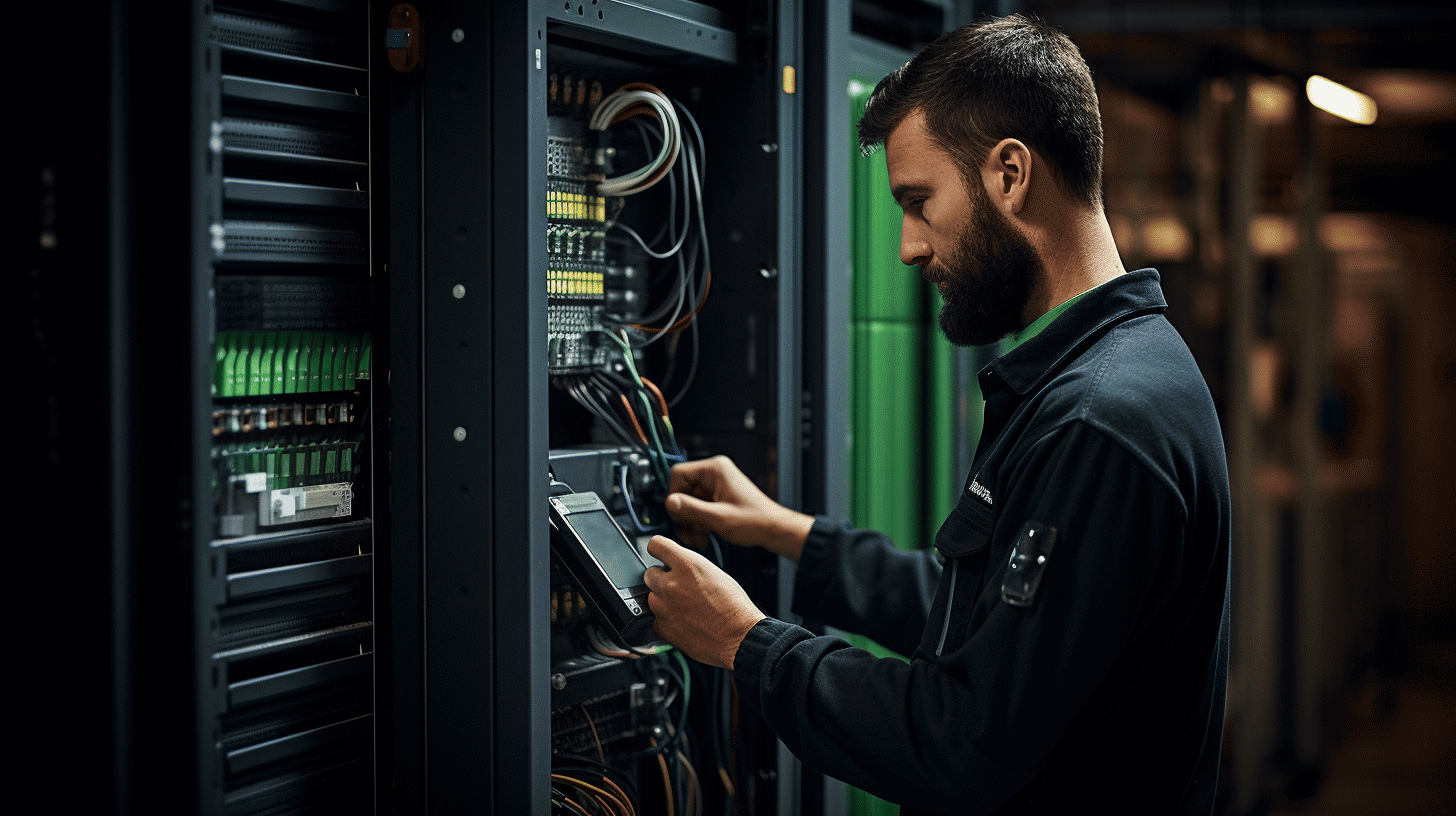UPS Maintenance: Vital Steps & Why You Can't Skip Them
Harnessing a reliable uninterruptible power supply (UPS) system is crucial for many UK-based businesses, due to its ability to ensure operational continuity, even in the face of an unexpected power outage. However, merely possessing a UPS system won't suffice - it needs regular maintenance and, when necessary, timely remedial work to function at optimum capacity. This article provides you with a comprehensive guide for everything you need to know about the significant aspects of UPS system maintenance, the importance of remedial work, factors to consider, recommended guidelines and the undeniable benefits of such practices. By gaining a thorough understanding of these factors, you can help your business stay ahead of power disruptions and maintain the highest level of operational efficiency.

Significance of Regular UPS Maintenance
An Uninterruptible Power Supply (UPS) system serves as the heart of any organisation's electrical infrastructure, quietly providing a safe, constant, and reliable stream of power to essential devices. It immediately bridges the gap during power outages, mitigating any potential downtime and preserving the integrity of your electrical setup. However, like any significant appliance, its efficiency stands on the cornerstone of regular maintenance.
Ensuring Continuity of Power Supply
One cannot underscore the need for a continuous power supply in today's digitally driven world. A mere flicker can cost businesses significant capital, not to mention the inconvenience to personal users. An often-overlooked fact is the annual downtime average for the utility grid in the UK, which is currently eight hours and 45 minutes. That's almost an entire workday out the window. By maintaining the UPS system, potential power supply disruptions can be minimised, ensuring a seamless power supply.
This regular maintenance includes tasks like battery testing and replacement, ventilation checks, firmware updates, and general hardware inspections. With routine checks and optimal upkeep, the chances of UPS failure decrease dramatically. Then, we don't have to worry about the possibility of unexpected and potentially significant downtime.
Improving Power Quality
Power isn't just about the 'on' or 'off' state, the quality matters too. Voltage variations and harmonic distortions can cause significant damage to delicate devices connected to the power grid. Regular UPS maintenance ensures that any such irregularities are swiftly corrected, thus providing clean, stable power that guarantees the longevity of your devices.
Maintaining your UPS isn't merely a task to check off a list. It's an investment in extending your backup power system lifespan and ensuring the sustenance of your digital operations. Understandably, regular maintenance may feel overwhelming to some. However, with a little diligence and support from experienced professionals, your organisation can leverage maximum efficacy from the UPS system.
In conclusion, to fully utilise the UPS, and sustain the continuity and quality of power supply, regular maintenance is more than a necessity. The benefits far outweigh the effort, delivering a seamless power source, optimised device performance, and peace of mind.
Determining Factors for UPS Maintenance
When it comes to maintaining a UPS (Uninterrupted Power Supply) system, it can often seem like navigating complicated territory. However, understanding the critical factors that influence its upkeep can simplify the task. Two primary aspects that significantly impact UPS maintenance are the frequency of maintenance checks and the type of battery used.
Frequency of Maintenance
One of the first steps in efficient UPS maintenance is determining how often the system needs to be examined. According to HTM 06-01, UPS systems should ideally be tested and maintained at least twice a year. Regularly scheduled check-ups help identify potential issues before they escalate, ensuring the continuity of power supply and avoiding expensive repairs or replacements.
Some key elements to be examined during these maintenance routines should include:
- Checking for signs of wear and tear
- Testing of batteries for performance
- Verifying software for accurate performance metrics
Being vigilant about these routine checks can extend the lifespan of your UPS system and maintain its efficiency.
Battery Types
Another determinant in UPS maintenance is the type of battery used. Most UPS systems today use sealed or maintenance-free batteries since they are safer in terms of handling. However, the kind of battery employed directly impacts the overall lifecycle of the UPS system.
Batteries are the heart of any UPS system, and their health significantly impacts the performance of the system. While sealed batteries decrease the need for regular maintenance, they do need to be replaced periodically for the UPS to function optimally. It's critical to understand the lifecycle of UPS batteries and when to replace them to keep your UPS system in good working condition.
In summary, while UPS maintenance can seem daunting, understanding the aspects of frequency of maintenance and battery types can simplify the process. Regular maintenance checks and mindful battery handling ensure that your UPS system continues to operate smoothly, protecting your equipment from power interruptions and potential downtime. Remember, an efficiently maintained UPS system not only improves longevity but also increases system reliability.
Regulations and Guidelines for UPS Systems
Whether you're a business owner seeking to install an Uninterruptible Power Supply (UPS) or an electrician tasked with implementing a robust system, understanding the regulatory landscape is key. In the complex world of electrical systems, directives such as the British Standards BS62485 and BS 7671:2018 18th Edition, along with Health and Safety Executive (HSE) guidelines, form the essential roadmap for quality and safety.
BS62485 and BS 7671:2018 18th Edition regulations
Committing to understanding and following the BS62485 and BS 7671:2018 18th Edition regulations isn't just about ticking off a checklist. It's about ensuring the safety, performance, and sustainability of your UPS systems.
- BS62485: This is a comprehensive series of safety standards that outlines the foundational guidelines for secondary cells and batteries. It's a gold mine for anyone dealing with UPS systems since it details product safety regulations, transport instructions, and recycling methods.
- BS 7671:2018 18th Edition: At first glance, this might seem like a complex knot of legalese. However, it's a boon as it defines the best practices for electrical installations, including those related to UPS systems. It covers everything from installation methods to testing and inspection protocols, helping you maintain system integrity.
The takeaway here is simple - adherence to these regulations isn't optional but paramount. BS62485 and BS 7671:2018 guidelines are not just statements on paper; they dictate installation strategies, design concepts, and maintenance practices that ensure the healthy lifecycle of a UPS system.
HSE Guidelines
The Health and Safety Executive (HSE) adds another layer of regulatory practices that cannot be ignored when dealing with UPS systems. These national regulations focus on the inherent risks associated with all sorts of operations, including the installation and maintenance of electrical systems.
- HSE Electricity at Work Regulations 1989: This directive highlights the safety measures necessary to prevent accidents during "work activities" involving electricity. It specifically instructs on the precautions to be taken against electrical shock risks.
- HSE Work at Height Regulations 2005: UPS systems often require working at height during installation and maintenance. This set of rules outlines safety practices to prevent any hazards associated with height-related activities.
Ignoring these guidelines would be akin to dancing on thin ice - dangerously unpredictable. Upskilling on the HSE regulations means ensuring safety at the highest levels, thereby eliminating risks for both workers and end-users.
Effectively implementing UPS systems involves more than just understanding the technology. It also requires a thorough grasp of the relevant regulations and guidelines. By respecting the BS62485, BS 7671:2018 18th Edition regulations, and HSE guidelines, installers can safeguard their reputation, reduce risks, and ensure the longevity and functionality of their UPS systems.
Importance of Remedial Work
Leaping into the world of electrical systems, let's explore the essential dimension of remedial work. It may sound technical, but its importance is immense, touching the corners of safety, efficiency, and longevity. Just as how our bodies require routine check-ups to maintain our health, electrical systems also need regular inspections and necessary repairs, a process we refer to as " Remedial Work." You can think of it as a doctor's visit but for your UPS systems.
Safety
Have you ever asked yourself, "Why is safety so critical in the context of electrical systems?" The answer is quite straightforward. Electrical systems, if left unchecked, can become hazardous, leading to potential electric shocks, fires or even explosions. This is where electrical remedial work steps in. By uncovering potential faults and rectifying them before they turn into serious problems, remedial work acts as a protective shield for homes and commercial spaces alike.
- It helps pinpoint potential dangers like faulty switches or outdated wiring
- Electrical remedial work reduces the chances of electrical fires by ensuring that all parts of your system are in tip-top shape
"A stitch in time saves nine," as the old saying goes, and in the case of electrical systems, a timely repair could save lives!
Efficiency
Apart from safety, remedial work also plays a vital role in enhancing the efficiency of the electrical systems. An efficient system implies more than just robust functioning; it also means lower electricity bills and a reduced carbon footprint – a win-win for both your pocket and the planet.
- Regular check-ups and repairs ensure your electrical appliances work at their peak performance levels
- An efficient electrical system is less likely to overburden and trip, leading to fewer power outages
Hence, making electrical remedial work part and parcel of your maintenance routine is akin to striking gold in terms of operational efficiency.
Longevity
Increasing the lifespan of your electrical systems is yet another perk of remedial work. It's just like consistent car service prolongs your vehicle's life. Regular inspections detect minor repairs that, if left untreated, could inflict serious damage on the components, leading to early system failure.
- By preventing detrimental wear and tear, remedial work extends the life of the electrical system
- Well-maintained electrical systems could save you from expensive, complex repairs down the line
In the final analysis, remedial work is a preventive and proactive measure that promotes safety, efficiency, and longevity. But remember, this isn't a DIY task and is best left to the professionals. The next time you experience a flickering light or a power trip, it could be your electrical system reaching out for a "doctor's visit."
Now, sit back and ponder - Is your electrical system due for some essential remedial work?
UPS System Configuration for Maintenance Ease
Power outages, dreaded as they may be, are inevitable. One cannot ignore the unpredictable nature of the power supply, especially considering rapidly changing weather patterns and increasing power demands. To protect sensitive devices from such perilous disruptions, Uninterrupted Power Supply (UPS) systems become a buffer between you and any potential power disturbances.
Proper configuration of a UPS system escalates the user experience by providing added resilience and ensuring ease of maintenance. UPS systems can be configured in two prominent ways: N+1 configuration and Parallel configuration. Moreover, understanding, applying, and managing these configurations brings out the most of your Quick-Access UPS Solutions.
N+1 Configuration
N+1 configuration, often considered a form of redundancy, employs one more UPS module than what's deemed necessary to support a particular load. This extra unit caters to any unforeseen contingencies if the other UPS units fail. In effect, the extra UPS stands as a reserve: should a unit go offline, the reserve promptly takes its place ensuring no crucial data is endangered during this maintenance period. The N+1 configuration thereby provides:
- Higher level of reliability
- Greater apparent power
- Continuity of business processes
Parallel Configuration
On the other hand, the parallel configuration pairs UPS units to share a joint load. This configuration not only matches the N+1 in terms of reliability but often surpasses it due to the load being shared across multiple units, all working in conjunction. The Parallel configuration advantages are:
- Effective load sharing
- Increased power capacity
- Enhanced power continuity
Seamless power and quick access to your data are what UPS solutions strive to deliver and with the right configuration in place, you can ensure your day-to-day operations continue to hum along smoothly and without interruption. In our digital age where every microsecond matters, configuring your UPS systems thoughtfully is crucial to successfully riding out any storm that may cause a power disruption.
Benefits of Regular Maintenance
Regular maintenance is essential to keep your business afloat. It's like oiling your machine to remain operational and minimise glitches that would, in turn, thwart productivity. Especially in the world of technology, where every second counts, routine upkeep of your systems can bring immense value to your organisation. We live in an era where quick access to information and seamless transactions form the linchpin of a thriving business. Interruptions for even a minute can lead to significant losses. Hence, regular maintenance of systems like your Uninterruptible Power Supply (UPS) is not a choice, but a necessity.
Minimised Revenue Losses
Few things can dampen your business's spirit as much as downtime. When your systems are down, they halt crucial operations and impact your revenue negatively. You might be unaware, but every minute of downtime can cost your business dearly. One way to prevent these revenue losses is through regular maintenance.
Imagine a scenario where your UPS system fails. All your devices connected to it shut down abruptly, crashing your ongoing work, possibly erasing unsaved data, and leading to the unavailability of services. However, by ensuring regular maintenance, you could avoid these drastic scenarios. Timely checks can help in identifying potential issues that could lead to faults or failures. Just a small routine check can save your organisation from considerable revenue losses.
Prevention of Data Loss
Protecting data is a paramount concern for businesses. Companies store and manipulate large amounts of data that, if lost, can be irreplaceable or take considerable time and resource investment to recover. A regularly maintained and updated UPS system is crucial to safeguard your business data.
UPS systems play a vital role by providing an uninterrupted power supply, that lets you safely store your data and close active sessions in the event of unexpected power failure. If the UPS system itself collapses due to neglect or lack of regular maintenance, you're looking at a potential data loss disaster.
In conclusion, the thread of argument asserts the significance of regular maintenance, specifically of the UPS system. With an eye on the Future of UPS Technology, it highlights being proactive rather than reactive, emphasising preventive actions like regular checks as paramount to avoid costly downtime and prevent irreversible data loss.
Conclusion
Navigating the world of Uninterruptible Power Supply (UPS) systems and maintenance can prove daunting, yet the integral role they play in our businesses is undeniable. Regular UPS maintenance is a significant investment in safeguarding your daily operations, protecting data and revenue, and ensuring compliance with critical regulations.
The complexity of these systems calls for expertise and precision, ensuring each component is diligently monitored and maintained. As we've outlined, maintenance frequency, system configurations, and compliance with regulations like BS62485 and the 18th Edition of BS 7671:2018, all play critical roles in your UPS system's longevity and efficiency.
Similarly, comprehending the importance of remedial work gives a clear insight into the safety mechanisms, improved system efficiency, and prolonged lifespan of a UPS system. With a preventative approach, potential hitches are recognised early, minimising financial and data loss risks.
At Secure Power, your business continuity is our top priority. We provide dependable, top-tier three-phase UPS solutions and offer tailor-made UPS maintenance plans to ensure your power protection systems function at their peak always. As approved resellers of renowned UPS brands, our team embraces the latest knowledge to integrate your power protection solutions seamlessly.
Choose Secure Power for reliable and efficient power protection solutions tailored to your business needs. Financially savvy and data-conscious businesses don't just 'cope' with power outages. They strategize, prepare and prevent them. Let your strategy begin with us, your trusted partner in power protection solutions.
Frequently Asked Questions
-
What is remedial work in the context of uninterruptible power supply (UPS) system maintenance visits?
Remedial work in the context of UPS system maintenance visits refers to the necessary repairs or corrective actions that need to be taken after identifying any issues or faults during the maintenance visit. It involves fixing or replacing faulty components, addressing performance issues, and ensuring the proper functioning of the UPS system.
-
Why is it important to carry out remedial work as a result of UPS system maintenance visits?
Carrying out remedial work after UPS system maintenance visits is crucial to ensure the reliability and efficiency of the system. It helps identify and rectify any problems or potential failures, preventing costly downtime and equipment damage. By addressing issues promptly, the UPS system can continue to provide uninterrupted power supply and protect critical equipment.
-
Who should perform the remedial work for UPS systems?
The remedial work for UPS systems should be carried out by qualified and experienced professionals or technicians who have the knowledge and expertise in dealing with UPS systems. It is recommended to hire certified service providers or engage the services of the original equipment manufacturer (OEM) for reliable and effective remedial work.
-
What are the common types of remedial work for UPS systems?
Common types of remedial work for UPS systems include replacing faulty batteries, repairing or replacing faulty components such as capacitors or fans, cleaning and maintaining cooling systems, updating firmware or software, recalibration, and conducting load bank testing to ensure proper functionality.
-
How often should remedial work be carried out for UPS systems?
The frequency of remedial work for UPS systems depends on several factors such as system age, manufacturer recommendations, usage intensity, and the environmental conditions in which the system operates. It is generally recommended to schedule regular maintenance visits and address any identified issues promptly to ensure optimal performance.














